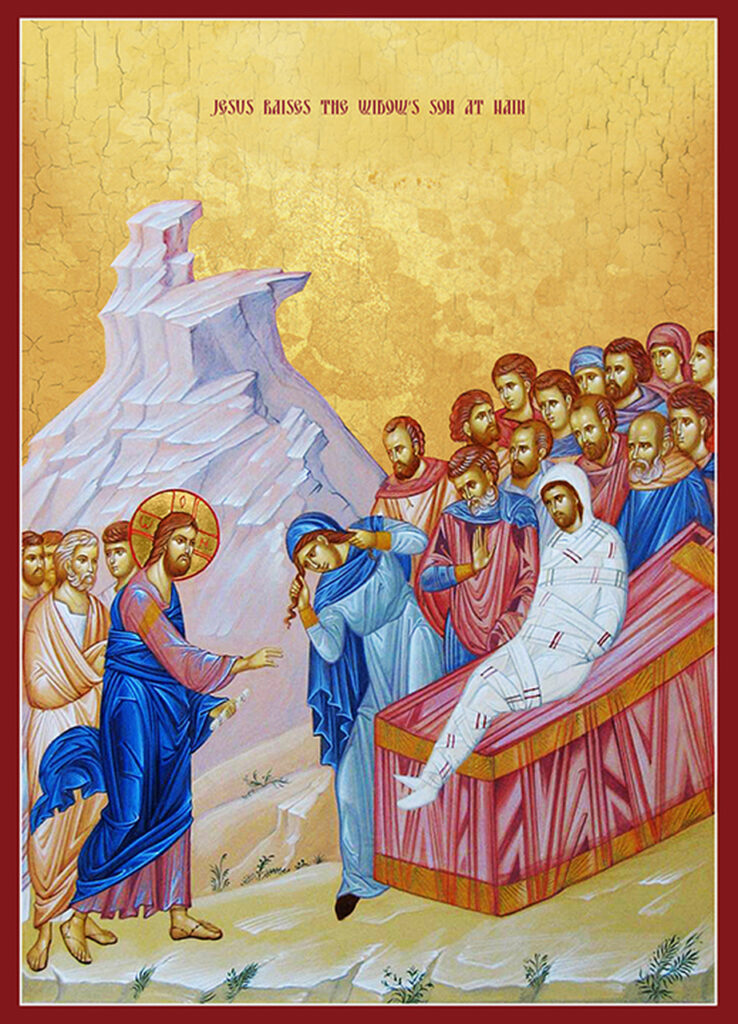In the name of the Father, and of the Son, and of the Holy Spirit, one God, Amen.
We mourn, dear brothers and sisters in Christ, and we weep over the dead. The one whom we love has been taken from us and we are at a loss what to do. But, when we lament over the death of a loved one we do so as having hope in the Resurrection, “For if we believe that Jesus died and rose again, even so God will bring with him those who sleep in Jesus,” (First Thessalonians 4:14) as the Apostle tells us. Our tears, therefore, are our expression of love, of sadness at being separated yet tempered with the knowledge that we may be united again through Christ.
What is the more tragic in my Christian life, more so than my crying at the falling asleep of one whom I love, is that I do not cry and weep at my sins. I have become so accustomed to sin that I merely shrug my shoulders and lie, “well, what else could I do?” Or, even worse, I have surrounded myself with so much sin that I do not even notice it—the graffiti on the walls of my soul have become so numerous I do not even remember how it was once decorated. I have separated myself from God, separated myself from my husband, and I carry my soul—my life—out of the city walls on a bier to be buried and my life to end in death among the tombs. I am a widow, with none left to save me.

And “Behold, the Bridegroom comes,” to me. I have not called on him, sought him out, but he comes nevertheless. He comes and restores my soul to life. He comes and both says the Word and brings me into contact with his flesh and I am no longer a widow but have life. And the wood of the bier—if I am to receive him, if I am to have life—becomes the wood of the Cross by which I crucify my sinful self and may rise in his Resurrection.
And he offers the same to you. The Lord has found us and calls us to recognise that our soul is dead because of our sins—and this is the death about which we should weep and lament the most. And if we do this, he will come to us and restore us to life that we may be truly alive in him. He will come and by giving you his Word which you may hear and his body which you may touch and eat, then you may be restored to life.
My dear brothers and sisters in Christ, let us mourn and lament our sin which is leading us to death, let us repent. And through repentance, through our lament, Christ will take us and lead us to life. Behold, the Bridegroom has come and will lead his bride, the Church, you and me, to life.
To our crucified and risen God and Saviour Jesus Christ the Bridegroom be all glory, honour and worship, together with his unoriginate Father and the All-holy, Good and Life-giving Spirit. Amen.
Brethren, he who sows sparingly will also reap sparingly, and he who sows bountifully will also reap bountifully. Each one must do as he has made up his mind, not reluctantly or under compulsion, for God loves a cheerful giver. And God is able to provide you with every blessing in abundance, so that you may always have enough of everything and may provide in abundance for every good work. As it is written, “He scatters abroad, he gives to the poor; his righteousness endures for ever.” He who supplies seed to the sower and bread for food will supply and multiply your resources and increase the harvest of your righteousness. You will be enriched in every way for great generosity, which through us will produce thanksgiving to God.
— Second Corinthians 9:6–11
At that time, Jesus went to a city called Nain, and his disciples and a great crowd went with him. As he drew near to the gate of the city, behold, a man who had died was being carried out, the only son of his mother, and she was a widow; and a large crowd from the city was with her. And when the Lord saw her, he had compassion on her and said to her, “Do not weep.” And he came and touched the bier, and the bearers stood still. And he said, “Young man, I say to you, arise.” And the dead man sat up, and began to speak. And he gave him to his mother. Fear seized them all; and they glorified God, saying, “A great prophet has arisen among us!” and “God has visited his people!
— Luke 7:11–16
